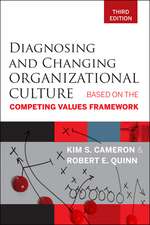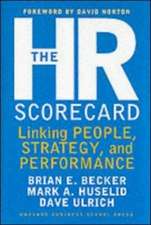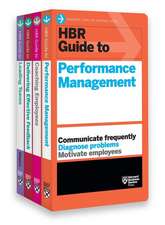The Art of Strategy: Sun Tzu, Michael Porter, and Beyond
Autor Hwy-Chang Moonen Limba Engleză Paperback – 8 aug 2018
| Toate formatele și edițiile | Preț | Express |
|---|---|---|
| Paperback (1) | 255.09 lei 6-8 săpt. | |
| Cambridge University Press – 8 aug 2018 | 255.09 lei 6-8 săpt. | |
| Hardback (1) | 702.59 lei 6-8 săpt. | |
| Cambridge University Press – 8 aug 2018 | 702.59 lei 6-8 săpt. |
Preț: 255.09 lei
Nou
Puncte Express: 383
Preț estimativ în valută:
48.82€ • 50.66$ • 40.80£
48.82€ • 50.66$ • 40.80£
Carte tipărită la comandă
Livrare economică 17-31 martie
Preluare comenzi: 021 569.72.76
Specificații
ISBN-13: 9781108455800
ISBN-10: 1108455808
Pagini: 332
Ilustrații: 15 b/w illus. 7 tables
Dimensiuni: 150 x 227 x 16 mm
Greutate: 0.54 kg
Editura: Cambridge University Press
Colecția Cambridge University Press
Locul publicării:Cambridge, United Kingdom
ISBN-10: 1108455808
Pagini: 332
Ilustrații: 15 b/w illus. 7 tables
Dimensiuni: 150 x 227 x 16 mm
Greutate: 0.54 kg
Editura: Cambridge University Press
Colecția Cambridge University Press
Locul publicării:Cambridge, United Kingdom
Cuprins
Introduction; 1. Getting started: overall assessment; 1.1. Sun Tzu: five elements for laying plans; 1.2. Porter: diamond model for analyzing competitiveness; 1.3. The integration of Sun Tzu and Porter; 1.4. Military case: Japanese attack on Pearl Harbor; 1.5. Business case: Sony's experience with the Walkman; 1.6. Conclusion and implications; 2. Economic consideration; 2.1. Sun Tzu: swift victory and local procurement in waging war; 2.2 Porter: value chain analysis in aligning activities; 2.3. The integration of Sun Tzu and Porter; 2.4. Military case: Napoleon's invasion of Russia; 2.5. Business case: Hyundai Motor's global strategy; 2.6. Conclusion and implications; 3. Avoiding competition; 3.1. Sun Tzu: complete victory by strategic attack; 3.2. Porter: five forces model for selecting the most attractive industry; 3.3. The integration of Sun Tzu and Porter; 3.4. Military case: Genghis Khan's terror strategy; 3.5. Business case: the changing attractiveness of the mobile phone industry; 3.6. Conclusion and implications; 4. Competitive positioning; 4.1. Sun Tzu: easy victory through tactical positioning; 4.2. Porter: generic strategy for advantageous positioning; 4.3. The integration of Sun Tzu and Porter; 4.4. Military case: Soviet's victory in the Battle of Stalingrad; 4.5. Business case: Toyota's changing position in automobile industry; 4.6. Conclusion and implications; 5. Enhanced advantage; 5.1. Sun Tzu: synergies from the combination of Cheng (Normal) and Chi (Abnormal); 5.2. Distinguishing operational effectiveness (OE) and strategic positioning (SP); 5.3. The integration of Sun Tzu and Porter; 5.4. Military case: the US failure in the Vietnam War; 5.5. Business case: Walmart's cost leadership strategy; 5.6. Conclusion and implications; 6. Unique positioning; 6.1. Sun Tzu: avoiding enemy's strengths and attacking their weaknesses; 6.2. Porter: choosing trade-offs for strategic fit; 6.3. The integration of Sun Tzu and Porter; 6.4. Military case: Hannibal's victory at Cannae; 6.5. Business case: Southwest Airlines' unique positioning; 6.6. Conclusion and implication; 7. Overcoming disadvantages; 7.1. Sun Tzu: turning the devious (disadvantage) into the direct (advantage); 7.2. Porter: turning corporate social responsibility (CSR) to creating shared value (CSV); 7.3. The integration of Sun Tzu and Porter; 7.4. Military case: the long march of the Red Army; 7.5. Business case: Nestlé's CSV activities in India; 7.6. Conclusion and implications; 8. Strategic flexibility; 8.1. Sun Tzu: variation of tactics; 8.2. Porter: consistency and changes in business strategy; 8.3. The integration of Sun Tzu and Porter; 8.4. Military case: the victory of the Greeks in the Trojan War; 8.5. Business case: Haier's successful transition through changes in its business strategy; 8.6. Conclusion and implications; 9. Extended strategies; 9.1 Sun Tzu: troop deployment and enemy investigation; 9.2. Porter: extended generic strategies; 9.3. The Integration of Sun Tzu and Porter; 9.4. Military case: Han Xin's victory in the Battle of Jingxing; 9.5. Business case: Tata Motor's failure in Tata Nano; 9.6. Conclusion and implications; 10. Location advantage; 10.1. Sun Tzu: exploitation of the terrain advantages; 10.2. Porter: cluster development for improving location advantage; 10.3. The integration of Sun Tzu and Porter; 10.4. Military case: Admiral Yi's victory in the Battle of Myeongnyang; 10.5. Business case: the competitiveness of Silicon Valley; 10.6. Conclusion and implications; 11. International strategy; 11.1. Sun Tzu: expeditionary strategy in the enemy territory; 11.2. Porter: configuration-coordination model for firms' internationalization; 11.3. The integration of Sun Tzu and Porter; 11.4. Military case: the UN Forces' victory in the Battle of Incheon; 11.5. Business case: Starbucks' success in China; 11.6. Conclusion and implicati
Recenzii
'This is a great book with historical, cross-cultural, and comparative perspectives.' Jeng Liu, Dean of College of Social Sciences, Tunghai University, Taiwan
'With an excellent synthesis of leading strategists of the East and West, this landmark study provides a fascinating, thought-provoking read for experts, students, and members of the larger business community who are looking for new ideas and strategies.' Gi-Wook Shin, Tong Yang, Korea Foundation, and Korea Stanford Alumni Chair of Korean Studies and Stanford University
'There could not be a better time for reading such a book where the West meets the East, the Ancients meet the Moderns, the generals meet the businessmen, and Sun Tzu meets Michael Porter. Brilliantly written and well structured around thirteen main themes, The Art of Strategy delivers a wealth of original perspectives, messages and questions that readers will want to return to again and again.' Patrick Messerlin, Professor Emeritus of Economics and Director, Groupe d'Economie Mondiale (GEM), Sciences Po, Paris
'Few people have conducted a comparative study of military and business theories as insightfully as Moon who, in this theoretically inspiring and empirically grounded study, provides a rigourous theoretical comparison between Sun Tzu, the most renowned ancient military strategist in the East, and Michael Porter, the leading contemporary business thinker in the West. With clear examples of respective military and business cases including Japan's attack on Pearl Harbor and Sony's experience with the Walkman, this brilliant and remarkably mind-opening book will become an essential reading for anyone who wishes to pursue a more sophisticated wisdom of strategic thinking.' Jong-Ho Jeong, Seoul National University
'Dr Moon does a great job integrating Sun Tzu's military strategy with Michael Porter's business strategy. This book offers new, broad, and profound insights into the essence of strategy.' Kazuhiro Asakawa, Mitsubishi Chaired Professor of Management, Graduate School of Business Administration, Keio University, Tokyo
'Professor Moon's path-breaking synthesis of Sun Tzu and Michael Porter moves beyond the two great minds' respective strengths and renders a masterpiece on how to strive for success through win-win solutions, which is so timely and much needed for a world with increasing confrontation and zero-sum mentality.' Lu Zheng, Tsinghua University, Beijing
'With an excellent synthesis of leading strategists of the East and West, this landmark study provides a fascinating, thought-provoking read for experts, students, and members of the larger business community who are looking for new ideas and strategies.' Gi-Wook Shin, Tong Yang, Korea Foundation, and Korea Stanford Alumni Chair of Korean Studies and Stanford University
'There could not be a better time for reading such a book where the West meets the East, the Ancients meet the Moderns, the generals meet the businessmen, and Sun Tzu meets Michael Porter. Brilliantly written and well structured around thirteen main themes, The Art of Strategy delivers a wealth of original perspectives, messages and questions that readers will want to return to again and again.' Patrick Messerlin, Professor Emeritus of Economics and Director, Groupe d'Economie Mondiale (GEM), Sciences Po, Paris
'Few people have conducted a comparative study of military and business theories as insightfully as Moon who, in this theoretically inspiring and empirically grounded study, provides a rigourous theoretical comparison between Sun Tzu, the most renowned ancient military strategist in the East, and Michael Porter, the leading contemporary business thinker in the West. With clear examples of respective military and business cases including Japan's attack on Pearl Harbor and Sony's experience with the Walkman, this brilliant and remarkably mind-opening book will become an essential reading for anyone who wishes to pursue a more sophisticated wisdom of strategic thinking.' Jong-Ho Jeong, Seoul National University
'Dr Moon does a great job integrating Sun Tzu's military strategy with Michael Porter's business strategy. This book offers new, broad, and profound insights into the essence of strategy.' Kazuhiro Asakawa, Mitsubishi Chaired Professor of Management, Graduate School of Business Administration, Keio University, Tokyo
'Professor Moon's path-breaking synthesis of Sun Tzu and Michael Porter moves beyond the two great minds' respective strengths and renders a masterpiece on how to strive for success through win-win solutions, which is so timely and much needed for a world with increasing confrontation and zero-sum mentality.' Lu Zheng, Tsinghua University, Beijing
Descriere
In The Art of Strategy, Moon provides a novel and systematic integration of the two dominant strategy frameworks of the East and West: Sun Tzu's military strategy and Michael Porter's business strategy. This will appeal to scholars, students, practitioners and general readers with an interest in strategy.






















